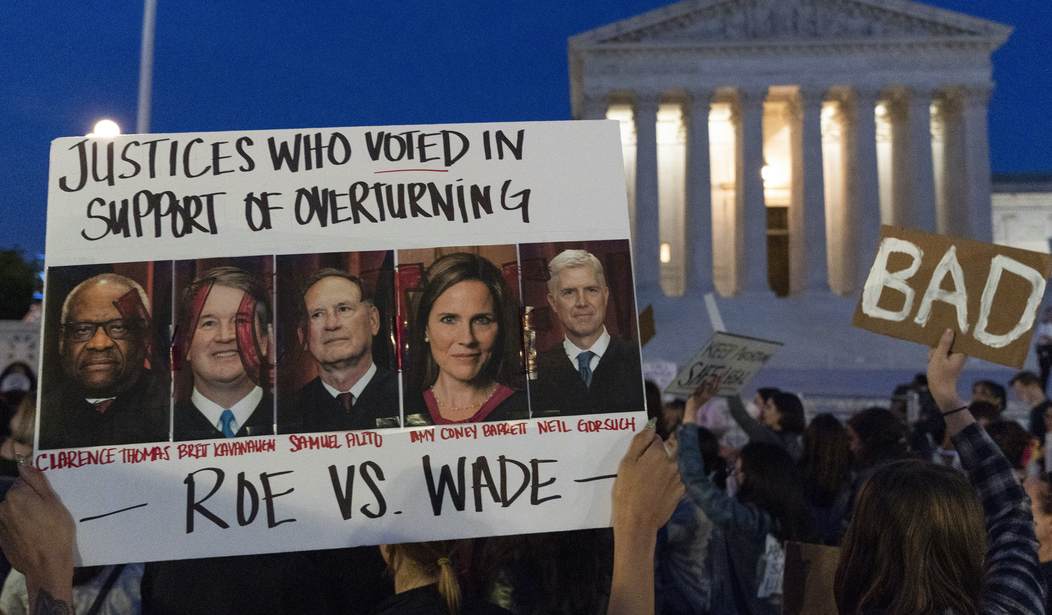Monday, the political and legal worlds were shaken by the leak of a draft opinion by Justice Samuel Alito in Dobbs v. Jackon (see Politico Tries to Pre-Game SCOTUS by Publishing Leaked Draft Opinion Overturning Roe). The opinion had five votes and burned the odious Roe v. Wade decision to the ground taking with it the unholy and pagan pro-abort edifice built upon that foundation.
Since that time, the Supreme Court, the justices who agree with Justice Alito’s opinion, have been subjected to scurrilous attacks and reason itself turned on its head. The core of the Democrat party, picking up on the lessons they learned from the BLM protest, have taken to street violence (see WATCH: Violence Breaks out at Pro-Abortion Protest After Democrat Politicians Call to ‘Fight’), that is, those who aren’t actively encouraging child-murder (The Left Ghoulishly Glamorizes Abortion). And Joe Biden is slobbering and howling (Biden Lies About the SCOTUS Draft Opinion, Ends up Making Things So Much Worse).
Equally amusing have been some of the Republican reactions. Lisa Murkowski and sister quisling Susan Collins have been out front claiming that some recently confirmed justices “lied” to them to win their vote (my colleague Sister Toldjah covers the dismantling of that argument by Jonathan Turley in Jonathan Turley Triggers Meltdowns After Debunking Key Schumer Claim About Conservative Justices). I fully expect to receive a fundraising email from Mitch McConnell any day now telling me that we must preserve abortion to avoid electoral Armageddon. (Perhaps I’m being unfair here, but I’ve always felt the GOP Establishment’s opposition to abortion was nothing more than failure theater intended to gull the rubes out in flyover country out of a few bucks.) Among the most risible is an op-ed by Bret Stephens, the Jennifer-Rubin-esque “conservative” columnist for the New York Times, Bret Stephens. In his opinion piece titled Overturning Roe Is a Radical, Not Conservative, Choice, Stephens tries to use some tired verbal kung-fu to upbraid five conservatives that they really aren’t conservative.
His first argument is that even though the putative majority might think Roe was a horrible decision that has done immense damage to our society and institutions, fifty years is a long time.
As you’ll no doubt agree, Roe v. Wade was an ill-judged decision when it was handed down on Jan. 22, 1973.
It stood on the legal principle of a right to privacy found, at the time, mainly in the penumbras of the Constitution. It arrogated to the least democratic branch of government the power to settle a question that would have been better decided by Congress or state legislatures. It set off a culture war that polarized the country, radicalized its edges and made compromise more difficult. It helped turn confirmation hearings for the Supreme Court into the unholy death matches they are now. It diminished the standing of the court by turning it into an ever-more political branch of government.
But a half-century is a long time. America is a different place, with most of its population born after Roe was decided. And a decision to overturn Roe — which the court seems poised to do, according to the leak of a draft of a majority opinion from Justice Samuel Alito — would do more to replicate Roe’s damage than to reverse it.
It would be a radical, not conservative, choice.
This is what most any hard-core, unrepentant drug addict or alcoholic will tell you. “Sure, it isn’t a healthy life style but I’ve done if for 50 years, so why should I stop now?” Or, in the words of the immortal philosopher Keith Richards, “I only get ill when I give up drugs.”
Indeed, a half-century is a long time, but the longevity of injustice is not a logical reason to retain the injustice. I wonder if a leak of the opinion in Brown vs. Board of Education would have provoked Stephens to defend Plessy v Ferguson, the case that established the pernicious “separate but equal” doctrine. That “precedent” was nearly 60 years old when the ruling on Brown was announced. Korematsu v. United States is almost 80 years old (and still the law of the land), would Stephens agree to the internment of US citizens who had the wrong ancestry…other than white people, I mean, because if they were of European extraction, it goes without saying that Stephens and his employer would be in favor of that.
Stephens goes on to extol the virtues of stare decisis and quotes Hamilton in Federalist 78:
“To avoid an arbitrary discretion in the courts,” Alexander Hamilton wrote in Federalist No. 78, “it is indispensable that they” — the judges — “should be bound down by strict rules and precedents, which serve to define and point out their duty in every particular case that comes before them.”
He ignores what Hamilton was talking about. Hamilton is clearly referring to how the courts interpret the difference between two laws passed by Congress. He is not talking about an imagined Constitutional right that might have had its origins in a plate of bad curry because it has no foundation in the law.
Nor does this conclusion by any means suppose a superiority of the judicial to the legislative power. It only supposes that the power of the people is superior to both; and that where the will of the legislature, declared in its statutes, stands in opposition to that of the people, declared in the Constitution, the judges ought to be governed by the latter rather than the former. They ought to regulate their decisions by the fundamental laws, rather than by those which are not fundamental.
In the case of Roe, the Supreme Court invented a right that rejected existing state laws (that would be the whole “power of the people” thing) and a few centuries of British common law in favor of its own judgment.
Then he goes on to warn the Supreme Court, which he has just chastised about the dangers of the impulse to become too political, to become political.
But the pro-lifers would soon rediscover the meaning of another conservative truism: Beware of unintended consequences. Those include the return of the old, often unsafe, illegal abortion (or abortions in Mexico), the entrenchment of pro-choice majorities in blue states and the likely consolidation of pro-choice majorities in many purple states, driven by voters newly anxious over their reproductive rights. Americans are almost evenly divided on their personal views of abortion, according to years of Gallup polling, but only 19 percent think abortion should be illegal under all circumstances.
And no editorial from the weaklings infesting the right now can be complete without some degree of panty-wetting about how bad things could become.
Yet the decision will also discredit the court as a steward of whatever is left of American steadiness and sanity, and as a bulwark against our fast-depleting respect for institutions and tradition. The fact that the draft of Justice Alito’s decision was leaked — which Chief Justice Roberts rightly described as an “egregious breach” of trust — is a foretaste of the kind of guerrilla warfare the court should expect going forward. And not just on abortion: A court that betrays the trust of Americans on an issue that affects so many, so personally, will lose their trust on every other issue as well.
Yep, because someone associated with the Supreme Court violated their work contract and leaked the Alito opinion, the Supreme Court should withdraw the opinion because the leaker, having been notified that their scheme worked, would never ever do it again. My head hurts after writing that.
Great actions are never without great risks. What Justice Alito is on the cusp of doing is saving about 700,000 babies each year from the fate of being dismembered. That is a worthy cause, and all of Stephens’ arguments and the arguments of Collins and Murkowski and the whole gaggle of vicious pro-aborts pale before it. Our Founders never contemplated the courts creating law from whole cloth, and the fact that this grotesque arrogation of power by the Burger Court has survived 50 years is a source of national shame, not something to be pointed out as how things ought to be done.











Join the conversation as a VIP Member